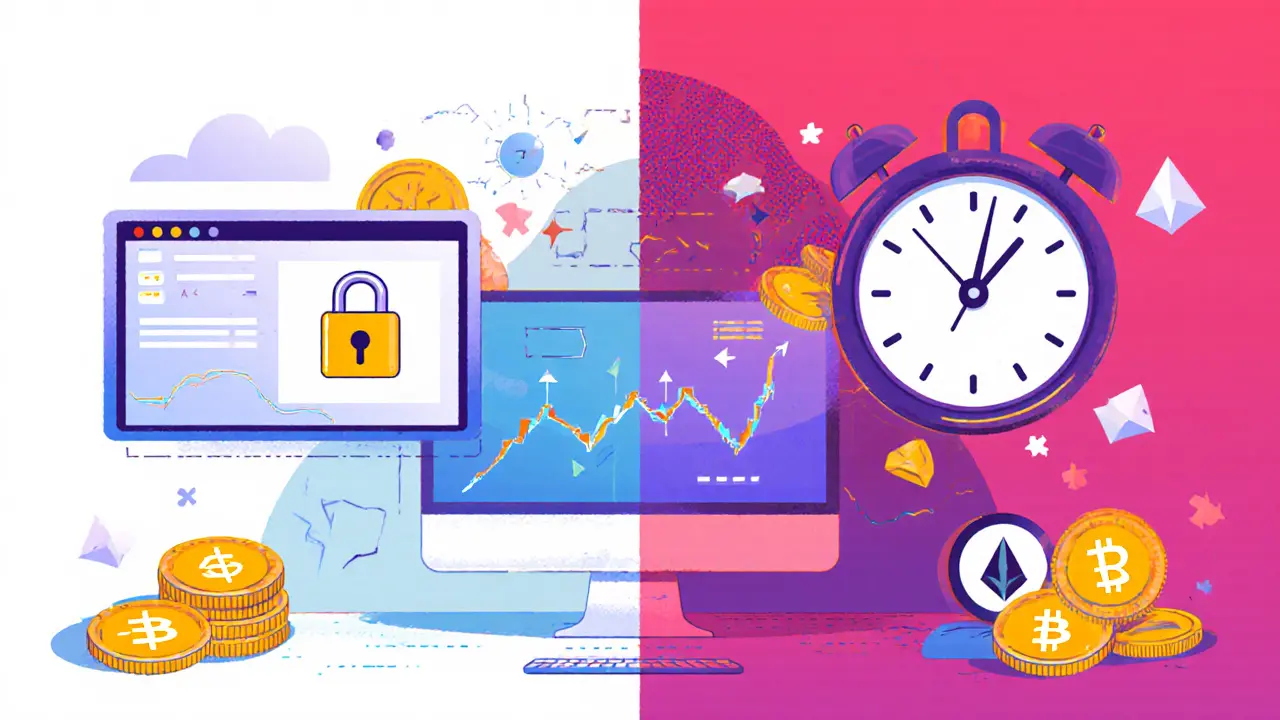VPN Risk Assessment Tool
This tool estimates your risk level of being detected when trading cryptocurrency in Iran using a VPN. Based on your current practices, it provides a risk assessment and personalized recommendations.
Important: This tool is for informational purposes only. No method is completely foolproof against detection.
Iranian crypto traders have turned to VPN crypto Iran as a lifeline, but the safety net is fraying fast. Between stricter exchange bans, sophisticated fingerprinting tools, and aggressive government crackdowns, the odds of being caught are climbing. This guide breaks down how detection works, where the biggest pitfalls lie, and what you can actually do to stay under the radar.
Why VPNs Became the Go‑to Tool for Iranian Traders
Since the U.S. and EU tightened sanctions on Iran’s financial system, local exchanges like Nobitex is Iran’s largest cryptocurrency exchange, handling over 80% of domestic crypto volume became the primary gateway for buying and selling digital assets. However, the Central Bank of Iran bans any domestic payments using crypto, forcing traders to hide their IP addresses and appear as foreign users. A VPN (Virtual Private Network) encrypts internet traffic and routes it through servers in other countries, effectively masking the user’s real location.
Between January and July 2025, Iranian traders moved roughly $3.7 billion in crypto, a clear signal that the market still thrives despite sanctions. Yet the same period saw a sharp drop in volume after April, when enforcement intensified and VPNs started to lose their invisibility.
How Exchanges Detect VPN Users
Early geoblocking relied on simple IP checks. Modern platforms now add layers of analysis:
- Device fingerprinting: browsers leak information about OS, screen size, installed fonts, and graphics drivers. Even with a VPN, the same fingerprint can link sessions.
- Transaction timing patterns: Many Iranian traders operate on a similar schedule (e.g., early morning Tehran time). If withdrawals cluster around those windows, analytics flag the accounts.
- Withdrawal destination analysis: Repeated transfers to wallets tied to known Iranian addresses or to the TRON network-where TRON network is a blockchain platform heavily used by Iranian exchanges for fast transfers-raise red flags.
- Behavioral analytics: mouse movements, typing speed, and even the way a user scrolls can be profiled.
When a VPN connection drops mid‑transaction, the trader’s real IP flashes instantly, triggering an automatic suspension. Free VPN services are especially risky because they often lack robust encryption and may log traffic for resale.
Common Pitfalls That Lead to Immediate Account Freezes
Even seasoned users slip up. The most frequent mistakes are:
- Using a VPN with shared IPs that are already blacklisted.
- Logging in from a domestic Iranian device while the VPN is active, allowing the exchange to match device fingerprints to known Iranian hardware.
- Relying on email registration only-many exchanges now require KYC verification for large withdrawals.
- Switching servers mid‑session, which creates a new IP signature and alerts the platform’s monitoring system.
Each misstep can result in a one‑click account lock, freezing any crypto held on the exchange.
The Underground Ecosystem: Full‑Service Circumvention Packages
Because single‑tool approaches are failing, a shadow market has sprung up offering end‑to‑end solutions:
- Foreign IBANs: Enables traders to deposit fiat into non‑Iranian banks.
- SIM cards for OTPs: Provides overseas phone numbers for two‑factor authentication.
- Fake residency documents: Allows creation of accounts that pass basic KYC checks.
These bundles are sold through encrypted messaging groups and often include a premium VPN that promises dedicated IPs, dedicated servers, and custom obfuscation layers to defeat deep‑packet inspection.
Enforcement Surge in 2025: What Changed?
January 2025 saw the Iranian government freeze over one million bank accounts linked to crypto activities. The Iran Cyber Police (FATA) ramped up cyber‑sweeps, targeting Telegram channels that advertised circumvention tools. Simultaneously, blockchain intelligence firms launched a wallet‑identification bounty program specifically aiming at Nobitex users. The result? A cascade of account freezes on both domestic and foreign exchanges.
The Ministry of Energy continues to issue mining licenses, but the Central Bank of Iran remains adamant about prohibiting crypto payments. This duality pushes traders to stay underground, while the law enforcement side becomes ever more adept at linking on‑chain activity to real‑world identities.
Practical Tips to Lower Detection Risk
If you must trade, follow these hardened steps:
- Choose a reputable paid VPN that offers dedicated IPs in privacy‑friendly jurisdictions (e.g., Switzerland, Iceland).
- Never log into the exchange from the same device you use for daily Iranian browsing. Keep a clean, dedicated device for trading.
- Enable multi‑hop routing: a VPN inside a Tor circuit adds an extra layer of obfuscation.
- Randomize transaction times. Use scripts to schedule trades at varied intervals rather than a fixed schedule.
- Split funds across multiple exchanges and wallets to avoid large, traceable flows.
- Use privacy‑focused cryptocurrencies (e.g., Monero) for moving value between wallets before converting to fiat on a foreign platform.
- Regularly check for DNS leaks and IP leaks using online tools before each session.
Remember, no method is foolproof. Treat every trade as a potential exposure point.

Future Outlook: Will VPNs Remain Viable?
Analysts predict that detection methods will keep evolving. As blockchain intelligence platforms expand their Iranian‑focused monitoring, even the most obscure VPN traffic will be profiled. Some experts foresee a shift toward decentralized finance (DeFi) protocols that operate entirely on‑chain, eliminating the need for centralized exchanges that enforce KYC.
Nevertheless, until DeFi solutions become truly mainstream and user‑friendly for Iranians, VPNs-paired with comprehensive obfuscation strategies-will likely stay the primary, albeit increasingly risky, avenue for accessing the global crypto market.
Detection Methods vs. Risk Levels
| Detection Technique | What It Looks For | Risk Level (High/Medium/Low) |
|---|---|---|
| IP Geolocation | Known VPN or proxy IP ranges | High |
| Device Fingerprinting | Consistent hardware signatures across sessions | Medium |
| Behavioral Analytics | Transaction timing, volume spikes, repeated withdraw‑to‑same wallets | High |
| Blockchain Flow Analysis | Large clusters of transfers on TRON or other Iran‑heavy chains | Medium |
| VPN Drop Detection | d>Sudden IP change mid‑session | High |
Frequently Asked Questions
Can I use a free VPN for crypto trading in Iran?
Free VPNs often lack strong encryption, have shared IPs, and may log traffic. They are much more likely to be flagged by exchanges and can even expose your data to third parties. A reputable paid service with dedicated IPs is strongly advised.
What happens if my VPN connection drops during a trade?
The exchange instantly sees your real Iranian IP, marks the session as suspicious, and usually freezes the account. Some platforms also block the associated wallet, making fund recovery difficult.
Is using a VPN illegal in Iran?
Iranian law bans unauthorized circumvention of internet controls, including VPNs that hide your location. Users risk both cyber‑police raids and banking penalties if caught.
Which exchanges are most tolerant of Iranian VPN users?
Historically, Binance allowed email‑only sign‑ups, but tightened KYC in late 2021. Some smaller DeFi platforms remain less regulated, but they lack liquidity and support. Always check the latest policy before signing up.
How can I check if my VPN is leaking my real IP?
Visit a site like https://ipleak.net before logging in. Look for DNS leaks, WebRTC leaks, and IP address mismatches. Run the test each time you switch servers.

11 Comments
Ron Murphy
Been using a Swiss-based VPN with dedicated IP for 8 months now. No drops, no flags. The key? Never touch the exchange from the same machine you use for Telegram or banking. Also, Tor + VPN is overkill but works if you’re paranoid. I’ve seen too many guys get caught because they thought 'free NordVPN' was enough.
Prateek Kumar Mondal
VPN alone is dead. You need fake ID, foreign SIM, clean device, and random trade times. I use Monero to shuffle then swap on KuCoin. No KYC, no problem. Just don’t withdraw to your cousin’s wallet in Tehran.
Nick Cooney
So let me get this straight… you’re telling me the Iranian government is blocking crypto… but still issuing mining licenses? That’s like banning cash but letting people print their own dollar bills. Also, ‘dedicated IPs’? Bro, if your VPN provider has a database of ‘Iranian trader IPs’, you’re already cooked. This whole thing is a cat-and-mouse game where the cat has a drone.
Wayne Overton
Stop using VPNs. Just use DeFi. End of story.
Alisa Rosner
OMG YES!! I just started using a paid VPN + Tor combo and I’m SO relieved!! 🙌 Also, I use https://ipleak.net every single time before I log in - it’s a lifesaver!! Don’t forget to check WebRTC too!! 💕
Anna Mitchell
It’s wild how people still think a VPN is enough. The real game is behavioral camouflage. If you trade every morning at 7:30 Tehran time, you’re basically waving a flag. Randomize. Even if it’s inconvenient.
Pranav Shimpi
Free VPNs are trash. I got banned from Binance twice because I used Hidemyass. Now I use Mullvad with dedicated IP and a burner laptop. Also stop using TRON for transfers. Use Monero. Simple. No debate.
jummy santh
As a Nigerian trader who has navigated similar financial restrictions, I must say: the Iranian community’s resilience is admirable. However, the use of foreign IBANs and fake residency documents carries immense legal risk - not only from Iranian authorities, but also from international compliance frameworks. One must weigh the cost of convenience against the potential for asset seizure and criminal liability. I recommend consulting a legal advisor familiar with both Iranian sanctions and FATF guidelines before proceeding.
Kirsten McCallum
You’re all just delaying the inevitable. The blockchain doesn’t lie. Your IP is the least of your worries. Your wallet history, your transaction patterns, your device - they’re all fingerprinted. You think you’re clever? You’re just data points in a spreadsheet.
Henry Gómez Lascarro
Look, I’ve been in crypto since 2014. I’ve seen every scam, every regulation, every government crackdown. And let me tell you - this whole ‘VPN crypto Iran’ thing is a glorified Ponzi scheme built on delusion. You think you’re outsmarting the state? You’re just funding their surveillance budget. Every time you use a VPN, you’re paying for the very tools that will eventually catch you. And don’t even get me started on ‘fake residency documents’ - that’s not clever, that’s identity fraud, and you’re literally asking for a prison sentence. The only real solution is to stop trading altogether. Or move. Or both. But pretending you can outwit a totalitarian regime with a $10/month VPN is the definition of insanity.
Will Barnwell
Why are we even talking about this? Binance banned Iranian users in 2021. The whole thing’s dead. Just use P2P. Done. Stop overcomplicating it.